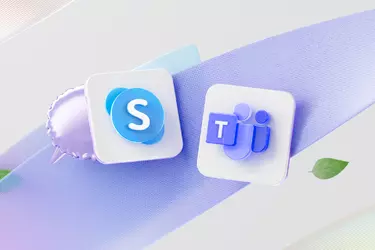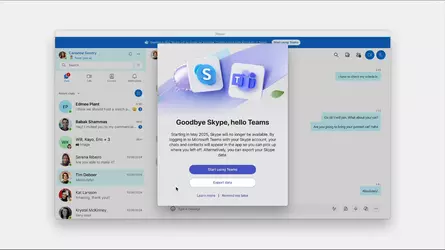Featured on Mar 1, 2025 by Null: Microsoft is sunsetting Skype.
Link | Archive

Skype will be retired on May 5th, and existing users will need to export their data or migrate to Teams.
It’s the end of an era. Microsoft is shutting down Skype in May and replacing it with the free version of Microsoft Teams for consumers. Existing Skype users will be able to log in to the Microsoft Teams app and have their message history, group chats, and contacts all automatically available without having to create another account, or they can choose to export their data instead. Microsoft is also phasing out support for calling domestic or international numbers.
”Skype users will be in control, they’ll have the choice,” says Jeff Teper, president of Microsoft 365 collaborative apps and platforms, in an interview with The Verge. “They can migrate their conversation history and their contacts out and move on if they want, or they can migrate to Teams.”
If you choose to move on and bring your Skype data with you, the exported data will include photos and conversation history. Microsoft also made a tool to easily view existing Skype chat history if you don’t want to move to Teams.
Skype will remain online until May 5th, so existing users will have around 60 days to decide whether they want to switch to Microsoft Teams or export their data. “If they do want to come to Teams then the first-run is pretty instantaneous because we’ve already done the work on the backend to restore their contacts, message history, and call logs,” says Amit Fulay, vice president of product at Microsoft.

Skype users will soon see a prompt to move to Microsoft Teams. Image: Microsoft
The transition to Microsoft Teams will keep Skype group chats intact, and during the 60-day window, Microsoft will also maintain interoperability so you can message contacts on Teams and those messages will be delivered to friends still using Skype.
If you do move to Microsoft Teams, there’s one big part of Skype that’s disappearing, though. Microsoft is removing the telephony parts that allow you to call domestic or international numbers or people’s cellphones. “Part of the reason is we look at the usage and the trends, and this functionality was great at the time when voice over IP (VoIP) wasn’t available and mobile data plans were very expensive,” explains Fulay. “If we look at the future, that’s not a thing we want to be in.”
Microsoft will honor existing Skype credits, but it will no longer offer new customers access to paid Skype features that allow you to make or receive international and domestic calls. Existing Skype subscription users will be able to use their Skype credits and subscriptions inside Microsoft Teams until the end of their next renewal period. Existing Skype Number users will also need to port their number over to another provider, as Microsoft is no longer supporting this, either.
The Skype Dial Pad will be part of Teams temporarily for existing credits and subscriptions, but Microsoft isn’t going to offer calling plans to Teams consumers like it does for businesses. “The world has really moved on,” says Teper. “Probably the biggest thing is higher bandwidth and lower data plan cost, from us and others, has really driven almost all of the traffic to VoIP.”
The admission of consumers moving on from calling phone numbers from Skype is also a large part of why the service is shutting down nearly 14 years after Microsoft first acquired it for $8.5 billion. Over the last decade, services like FaceTime, Messenger, and WhatsApp have made it simple to connect with friends through messaging, calls, and video chats in a way that Microsoft struggled to compete with through Skype and its many design iterations.
This was particularly evident in the early stages of the covid-19 pandemic, when consumers flocked to Zoom instead of Skype. “The Skype userbase actually grew at the beginning of the pandemic, and has been pretty flat since,” admits Teper. “It’s not shrunk in some dramatic way. It has been relatively flat over the last few years. We hope we’ll migrate most Skype users… but we want to make sure the users know they’re in control.”
Microsoft will now be fully focused on Teams for consumers, after launching the personal version in 2020. At the time, Microsoft said it was still fully committed to Skype, but it’s been clear in recent years that the company was preparing for the eventual retirement of Skype. In December, Microsoft killed off Skype credits and phone numbers in favor of subscriptions, another sign that the end of Skype was nearing.
“Initially the vision was to have one experience across work and life… but Teams was new and that was not realistically where we were in 2020,” reveals Teper. “So we continued to invest in Skype, and about two to three years ago we started bringing in the free Teams consumer experience with the new client. We wanted to wait until the adoption was at the scale where we could be very convinced it was the right time.”
The Skype retirement won’t result in job cuts, either, at least not immediately. “There’s one team, which is Microsoft Teams and Skype. On the backend it has actually evolved to a common team,” says Teper. “There won’t be layoffs, those folks are going to be working on making things better — whether it’s fun end user features or AI innovation, it’s really about doubling down on Teams.”
Microsoft is shutting down Skype in favor of Teams

Skype will be retired on May 5th, and existing users will need to export their data or migrate to Teams.
It’s the end of an era. Microsoft is shutting down Skype in May and replacing it with the free version of Microsoft Teams for consumers. Existing Skype users will be able to log in to the Microsoft Teams app and have their message history, group chats, and contacts all automatically available without having to create another account, or they can choose to export their data instead. Microsoft is also phasing out support for calling domestic or international numbers.
”Skype users will be in control, they’ll have the choice,” says Jeff Teper, president of Microsoft 365 collaborative apps and platforms, in an interview with The Verge. “They can migrate their conversation history and their contacts out and move on if they want, or they can migrate to Teams.”
If you choose to move on and bring your Skype data with you, the exported data will include photos and conversation history. Microsoft also made a tool to easily view existing Skype chat history if you don’t want to move to Teams.
Skype will remain online until May 5th, so existing users will have around 60 days to decide whether they want to switch to Microsoft Teams or export their data. “If they do want to come to Teams then the first-run is pretty instantaneous because we’ve already done the work on the backend to restore their contacts, message history, and call logs,” says Amit Fulay, vice president of product at Microsoft.

Skype users will soon see a prompt to move to Microsoft Teams. Image: Microsoft
The transition to Microsoft Teams will keep Skype group chats intact, and during the 60-day window, Microsoft will also maintain interoperability so you can message contacts on Teams and those messages will be delivered to friends still using Skype.
If you do move to Microsoft Teams, there’s one big part of Skype that’s disappearing, though. Microsoft is removing the telephony parts that allow you to call domestic or international numbers or people’s cellphones. “Part of the reason is we look at the usage and the trends, and this functionality was great at the time when voice over IP (VoIP) wasn’t available and mobile data plans were very expensive,” explains Fulay. “If we look at the future, that’s not a thing we want to be in.”
Microsoft will honor existing Skype credits, but it will no longer offer new customers access to paid Skype features that allow you to make or receive international and domestic calls. Existing Skype subscription users will be able to use their Skype credits and subscriptions inside Microsoft Teams until the end of their next renewal period. Existing Skype Number users will also need to port their number over to another provider, as Microsoft is no longer supporting this, either.
The Skype Dial Pad will be part of Teams temporarily for existing credits and subscriptions, but Microsoft isn’t going to offer calling plans to Teams consumers like it does for businesses. “The world has really moved on,” says Teper. “Probably the biggest thing is higher bandwidth and lower data plan cost, from us and others, has really driven almost all of the traffic to VoIP.”
The admission of consumers moving on from calling phone numbers from Skype is also a large part of why the service is shutting down nearly 14 years after Microsoft first acquired it for $8.5 billion. Over the last decade, services like FaceTime, Messenger, and WhatsApp have made it simple to connect with friends through messaging, calls, and video chats in a way that Microsoft struggled to compete with through Skype and its many design iterations.
This was particularly evident in the early stages of the covid-19 pandemic, when consumers flocked to Zoom instead of Skype. “The Skype userbase actually grew at the beginning of the pandemic, and has been pretty flat since,” admits Teper. “It’s not shrunk in some dramatic way. It has been relatively flat over the last few years. We hope we’ll migrate most Skype users… but we want to make sure the users know they’re in control.”
Microsoft will now be fully focused on Teams for consumers, after launching the personal version in 2020. At the time, Microsoft said it was still fully committed to Skype, but it’s been clear in recent years that the company was preparing for the eventual retirement of Skype. In December, Microsoft killed off Skype credits and phone numbers in favor of subscriptions, another sign that the end of Skype was nearing.
“Initially the vision was to have one experience across work and life… but Teams was new and that was not realistically where we were in 2020,” reveals Teper. “So we continued to invest in Skype, and about two to three years ago we started bringing in the free Teams consumer experience with the new client. We wanted to wait until the adoption was at the scale where we could be very convinced it was the right time.”
The Skype retirement won’t result in job cuts, either, at least not immediately. “There’s one team, which is Microsoft Teams and Skype. On the backend it has actually evolved to a common team,” says Teper. “There won’t be layoffs, those folks are going to be working on making things better — whether it’s fun end user features or AI innovation, it’s really about doubling down on Teams.”